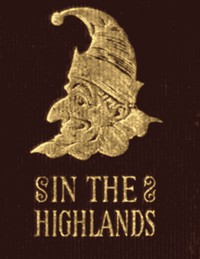Mr. Punch at the Play: Humours of Music and the Drama, Hammerton and Keene [i am reading a book TXT] 📗

- Author: Hammerton and Keene
Book online «Mr. Punch at the Play: Humours of Music and the Drama, Hammerton and Keene [i am reading a book TXT] 📗». Author Hammerton and Keene
["Mr. Chamberlain has expressed himself in sympathy with the scheme of the Rev. Forbes Phillips for running theatres in connection with the churches in country villages."]
There would, our artist imagines, be no difficulty in obtaining willing coryph�es among the pew-openers and philanthropic spinsters of the various parishes.
[Pg 111]

Mr. M'Chrustie (in the washing-room of the Minerva Club). "Look here, waiter, what's the meaning of this? These brushes are as beastly grimy as if they'd been blacking boots——!" Waiter. "Yes, sir: it's them members from the 'Junior Theshpian,' sir—as are 'ere now, sir. They do dye theirselves to that degree——!"
[Mr. M'C. rushes off and writes furiously to the Committee!
[Pg 112]
Q. What were the "palmy" days of the drama?
A. When they were first-rate hands at acting.
Motto for all Dramatic Performers.—"Act well your part."
A Band-Box.—An orchestra.
"What an awful voice that man's got!" said the manager, who was listening to the throaty tenor.
"Call that a voice," said his friend; "it's a disease!"
A Private Box.—A sentry box.
[Pg 113]

"You can't sit there, mum. These here seats are reserved."
"You don't seem to be aware that I'm one of the directors' wives!"
"And if you was his only wife, mum, I couldn't let you sit here."
[Pg 114]
During the dull season a certain manager has issued such a number of his autographs in order to ensure the proper filling of his house that he has in playfulness conferred on it the nickname of the ordertorium.
What Managers, Actresses, and Spectators all Want.—A good dressing.
Christmas Music for Theatres.—The "waits" between the acts.
What we want for the British drama generally is not so much native talent as imagi-native talent.
At the Music Halls.—The birds that fly by night—the acro-bats.
[Pg 115]
 Confr�res.
Confr�res.
Master Jacky (who took part in some school theatricals last term,—suddenly, to eminent tragedian who has come to call). "I say, you know—I act!"
[Pg 116]
 A PROP OF THE DRAMA
A PROP OF THE DRAMA
"What, back already, Archie! Was it a dull piece, then?"
"Don't know. Didn't stop to see. Just looked round stalls and boxes, and didn't see a soul I knew!—so I came away."
[Pg 117]
 SHOWING THAT SOMETIMES IT IS GOOD FOR A COBBLER NOT TO STICK TO HIS LAST
SHOWING THAT SOMETIMES IT IS GOOD FOR A COBBLER NOT TO STICK TO HIS LAST
Fair Matron. "I remember your acting 'Sir Anthony,' years ago, when I was a girl, Sir Charles! You did it splendidly!"
The Great Mathematician. "Ah, would you believe it, that bit of acting brought me more compliments than anything I ever did?"
Fair Matron. "I should think so, indeed!"
[Pg 118]
The Company that frequently fills a Theatre better than a Dramatic one.—The Stationers' Company.
The managers of Drury Lane, Gaiety, Alhambra and Empire Theatres ought ex-officio to be members of the Worshipful Guild of Spectacle-makers.

[Pg 119]

"Walking Lady" (late for rehearsal). "Oh, I'm so sorry to be late! I do hope you haven't all been waiting for me?"
Stage Manager (icily). "My dear Miss Chalmers, incompetence is the gift of heaven; but attention to business may be cultivated!"
[Pg 120]
 An Unkind Cut.
An Unkind Cut.
Amateur. "It was very kind of you to come to our performance the other night; but what did you think of my Hamlet? Pretty good?" Professional (feigning ecstasy). "Oh, my dear fellow, 'pon my word you know,—really I assure you, good's not the word!"
[Pg 121]

First Critic. "Well, have you seen the great tragedian in Romeo and Juliet?"
Second ditto. "I have; and I confess he didn't come up to my ixpictations. To tell ye the truth, I niver thought he would!"
[Pg 122]
 A CROWDED HOUSE
A CROWDED HOUSE
Angry Voice (from a back seat). "Ears off in front there, please!"]
[Pg 123]
 THE PROVINCIAL DRAMA
THE PROVINCIAL DRAMA
The Marquis (in the play). "Aven't I give' yer the edgication of a gen'leman?"
Lord Adolphus (spendthrift heir). "You 'ave!!"
[Pg 124]
 A CONDUCTOR OF HEAT
A CONDUCTOR OF HEAT
[Pg 125]
 "STARTLING EFFECTS!"
"STARTLING EFFECTS!"
Peep-Showman. "On the right you observe the 'xpress train a-comin' along, an' the signal lights, the green and the red. The green lights means 'caution,' and the red lights si'nifies 'danger'"——
Small Boy (with his eye to the aperture). "But what's the yaller light, sir?"
Peep-Showman (slow and impressive). "There ain't no yaller light—but the green and the red. The green lights means 'caution,' and the red lights si'nif——"
Small Boy (persistently). "But wha's the other light, sir?"
Peep-Showman (losing patience). "Tell yer there ain't no"—— (takes a look—in consternation)—"Blowed if the darned old show ain't a-fire!!"
[Pg 126]
EX NIHILO NIHIL FIT["Fashions in drama change as frequently as fashions in hats. It has been reserved for our own day to evolve the comedy of nothing-in-particular. Nowadays nothing happens in a play."—The Outlook.]
Scene—Nowhere in particular.Characters.
He, a nonentity.
She, another.
He. Dear——!
She (wearily). Oh please don't.
[Does nothing.
He. Why, what's the matter?
She. Nothing.
[He does nothing.
She. Well, you may as well go on. It will be something, anyhow. (Yawns.) Nothing ever seems to happen in this play. I don't know why. It isn't my fault. Oh, go on.
He. All right. Don't suppose it amuses me, though. Darling, I love you—will you marry me?
She (very wearily). Oh, I suppose so.
He. Thanks very much. (Kisses her.) There!
[Pg 128]
[Returns proudly to his seat, and does nothing.
She (with sudden excitement). Supposing I had said "No," would you have shot yourself?—would you have gone to the front?—would your life have been a blank hereafter? Would anything interesting have happened?
He (with a great determination in his eyes). Had you spurned my love——
She (excitedly). Yes, yes?
He (with emotion).—I should have—I should have—done nothing.
[Does it.
She. Oh!
He. Yes. As for shooting or drowning myself if any little thing of that sort had happened it would have been off the stage. I hope I know my place.
[She does nothing.
He (politely). I don't know if you're keen about stopping here? If not, we might——
She. We must wait till somebody else comes on.
He. True. (Reflects deeply.) Er—do you mote much?
[She sleeps. The audience follows suit. Curtain eventually.
[Pg 127]
 HOW HE OUGHT NOT TO LOOK
HOW HE OUGHT NOT TO LOOK
Excited Prompter (to the Ghost of Hamlet's father, who is working himself up to the most funereal aspect he can assume). "Now then, Walker, LOOK ALIVE!"
[Pg 129]
 PREHISTORIC SHAKSPEARE.—"MACBETH"
PREHISTORIC SHAKSPEARE.—"MACBETH"
"Infirm of purpose!
Give me the daggers."—Act II. Sc. 2.
[Pg 130]
 MUSIC-HALL INANITIES.—I.
Miss Birdie Vandeleur ("Society's Pet"—vide her advertisements passim) bawls the refrain of her latest song:—
MUSIC-HALL INANITIES.—I.
Miss Birdie Vandeleur ("Society's Pet"—vide her advertisements passim) bawls the refrain of her latest song:—
"Ow, I am sow orferly shy, boys!
I am, and I kennot tell wy, boys!
Some dy, wen I'm owlder,
Per'aps I'll git bowlder,
But naow I am orfer-ly shy!"
[Pg 131]
MUSIC-HALL INANITIES.—II. The Illustrative Method. "'E's not a tall man—Nor a short man—But he's just the man for me."
"'E's not a tall man—Nor a short man—But he's just the man for me."
 "Not in the army—Nor the nivy—But the royal artill-er-ee!"
"Not in the army—Nor the nivy—But the royal artill-er-ee!"
[Pg 132]
ATTENTION AT THE PLAY. (As performed at many London Theatres)Scene—Interior of a Private Box.
Time—Towards the end of the First Act of an established success.
Present—A party of Four.
No. 1 (gazing through opera glasses). A good house. Do you know anyone?
No. 2. Not a soul. Stay—aren't those the Fitzsnooks?
No. 3 (also using a magnifier). You mean the woman in the red feather at the end of the third row of the stalls?
No. 4. You have spotted them. They have got Bobby Tenterfore with them. You know, the Johnnie in the F. O.
No. 1. I thought Mr. Tenterfore was at Vienna.
No. 4. No; he was going, but they sent another chap. Brought him back from somewhere in the tropics.[Pg 134]
No. 3. Then what is Mr. Tenterfore doing in town?
No. 4. Oh! come home on leave. Lots of that sort of thing at the F. O.
No. 1 (having grown weary of looking at the audience). By the way, � propos de bottes, I have some money to invest. Can you suggest anything?
No. 3. They say that Diddlers Deferred will turn up trumps.
No. 1. What do you mean by that? I only want to pop in and out between the accounts.
No. 3. Then the Diddlers ought to suit you. They rose six last week, and ought to touch ten before settling day.
No. 1. Then I am on. Thanks very much for the information. Ah! the curtain has fallen. So much for the first act! (Enter visitor.) Ah! how are you? Where are you?
Visitor. Well, I have got a stall, but I have only just come into the house. What are they playing?
No. 2. I am sure I don't know; but if you are curious about it, here's the programme.
Visitor. And what's it all about?
No. 1 (on behalf of self and companions). We haven't the faintest notion.
[Conversation becomes general, and remains so until the end of the evening, regardless of the dialogue on the stage side of the curtain.
[Pg 133]
 Melodrama in the Suburbs.
Melodrama in the Suburbs.
Elder Sister. "Do give up, Nellie! They're only acting." Nellie (tearfully). "You leave me alone. I'm enjoying it!"
[Pg 135]
 The Ruling Passion.
The Ruling Passion.
Doctor. "No, my dear sir, we must keep ourselves quiet for the present. No stimulants—nothing more exciting than gruel. Gruel for breakfast, gruel for luncheon, gruel for dinner, gruel for——" Peter Pundoleful (a noted burlesque writer—though you wouldn't have thought it to look at him—rousing himself suddenly). "Ah! my dear doctor, why is there not a society for the prevention of gruelty to animals?"
[Pg 136]
HIS FIRST AND LAST PLAYRalph Essendean, aged about fifty, is discovered at a writing-desk. He studies a newspaper, from which he reads aloud, thoughtfully:—"So that a successful play may bring its author anything from five to twenty thousand pounds." He lays down the paper, mutters, "H'm!" and taking up a pencil bites it meditatively. Enter Mrs. Essendean.
Mrs. Essendean (crossing to Ralph, and placing her hand on his shoulder, asks affectionately). Well, dear, and how is the play getting on?
Ralph (irritably). You talk of the play, Matilda, as though it were possible to write a four-act drama in ten minutes. The play is not getting on[Pg 138] at all well, for the simple reason that I am only just thinking out the idea.
Mrs. Essendean (seating herself by the table). How nice, dear! And what is the idea?
Ralph (grimly). That is just what I am wondering about. Now if you will kindly retire to the kitchen and make an omelette, or discharge the cook, I shall be obliged.
[Leans over his desk.
Mrs. E. But, dear, I am sure the cook is a most excellent servant, and——
Ralph (turning round and speaking with repressed exasperation). That was simply my attempt at a humorous explanation of my wish to be alone, Matilda.
Mrs. E. (smiling indulgently and rising). Well, dear, of course if it's going to be a funny play, I know you would like to be alone. (Pausing at the open door.) And will you





Comments (0)